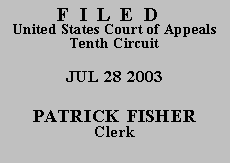

No. 02-3432
(D.C. No. 02-CV-3051-RDR)
SEAN L. EVANS,
After examining the briefs and appellate record, this panel has determined
unanimously that oral argument would not materially assist the determination of
this appeal. See Fed. R. App. P. 34(a)(2); 10th Cir. R. 34.1(G). The case is
therefore ordered submitted without oral argument.
Appellant Sean Evans, a military prisoner appearing pro se,(1) seeks review of the district court's denial of his petition for a writ of habeas corpus filed pursuant to 28 U.S.C. § 2241.(2) We affirm.
Mr. Evans pled guilty to raping and committing indecent acts with his twelve-year-old daughter in violation of the Uniform Code of Military Justice. He was sentenced to fifteen years confinement (confinement in excess of thirteen years was suspended for a period of thirteen years), a dishonorable discharge, forfeiture of all pay and allowances, and reduction to grade Private E-1. Raising various claims, Mr. Evans appealed his conviction to the United States Army Court of Criminal Appeals, which affirmed his conviction. Subsequently, the United States Court of Appeals for the Armed Forces denied his petition for review.
Mr. Evans, acting pro se, filed a petition for a writ of habeas corpus pursuant to 28 U.S.C. § 2241 with the United States District Court for the District of Kansas, claiming: (1) the sentence suspension provisions were unclear; (2) the trial judge's inquiry into the factual basis for his guilty plea was insufficiently penetrating, particularly as to inconsistent matters, and (3) his Fifth Amendment right to remain silent was violated by the admission of what he claimed were hearsay statements. The matter was referred to the Magistrate Judge, who recommended the appeal be dismissed because Mr. Evans's claims were properly presented to the military courts, and his claims were given "full and fair consideration." Evans v. Andraschko, No. 02-3051-RDR (October 7, 2002, Report and Recommendation at 4). The Report and Recommendation also stated:
Any party objecting to the recommended disposition may serve and file with the clerk of the district court written objections within 10 days of service of this Report and Recommendation. Any objection filed must specify the parts of the Report and Recommendation to which objections are made, and set forth the basis for such objections. Failure to file timely objections waives appellate review of both factual and legal questions.
Id. at 4-5 (citations omitted) (emphasis in original). No objections were filed. The district court adopted the Magistrate's Report and Recommendation and denied habeas relief.
After Mr. Evans filed his appeal in this Court, we issued a Show Cause Order requiring him to discuss whether his failure to file written objections to the Magistrate's Report and Recommendation waived appellate review of both factual and legal issues. He submitted his brief, but ignored our instructions to address this issue.
We have adopted a firm waiver rule, which "provides that the failure to make timely objection to the magistrate's findings or recommendations waives appellate review of both factual and legal questions." Moore v. United States,
950 F.2d 656, 659 (10th Cir. 1991). "This remains true for pro se litigants if the plaintiff was properly informed of the consequences of his failure to object. We may make an exception to this rule, however, where the interests of justice so require." Fottler v. United States, 73 F.3d 1064, 1065 (10th Cir. 1996) (citing Moore, 950 F.2d at 659).
Here, Mr. Evans was properly, and quite specifically, notified in the Magistrate Judge's Report and Recommendation of the consequences of failing to object. Mr. Evans did not object; thus, he has waived appellate review of these issues. Further, the interests of justice do not require us to make an exception in this case.(3)
Based upon the foregoing, we AFFIRM the denial of Mr. Evans's petition for a writ of habeas corpus and DISMISS his appeal.
Entered by the Court:
TERRENCE L. O'BRIEN
United States Circuit Judge
*. This order and judgment is not binding precedent except under the doctrines of law of the case, res judicata and collateral estoppel. The court generally disfavors the citation of orders and judgments; nevertheless, an order and judgment may be cited under the terms and conditions of 10th Cir. R. 36.3.
1.We construe his pro se appeal liberally. See Ledbetter v. City of Topeka, Kan., 318 F.3d 1183, 1187 (10th Cir. 2003).
2.A certificate of appealability is not necessary for a federal prisoner to appeal a final order in a 28 U.S.C. § 2241 proceeding. See Montez v.Mckinna, 208 F.3d 862, 867 (10th Cir. 2000).
3.Had appellate review not been waived we would still affirm. It is well accepted that review of a habeas petition filed by a military prisoner is proper, but such review is very narrow. Lips v. Commandant, United States Disciplinary Barracks, 997 F.2d 808, 811 (10th Cir. 1993) (citing Burns v. Wilson, 346 U.S. 137, 139 (1953)), cert. denied, 510 U.S. 1091 (1994). We review such claims if the issues raised were not given full and fair consideration by the military courts. See Burns, 346 U.S. at 142; Lips, 997 F.2d at 811; Watson v. McCotter, 782 F.2d 143, 144 (10th Cir.), cert. denied, 476 U.S. 1184 (1986). Mr. Evans's claims were properly presented to the military courts and were given full and fair consideration by those courts.